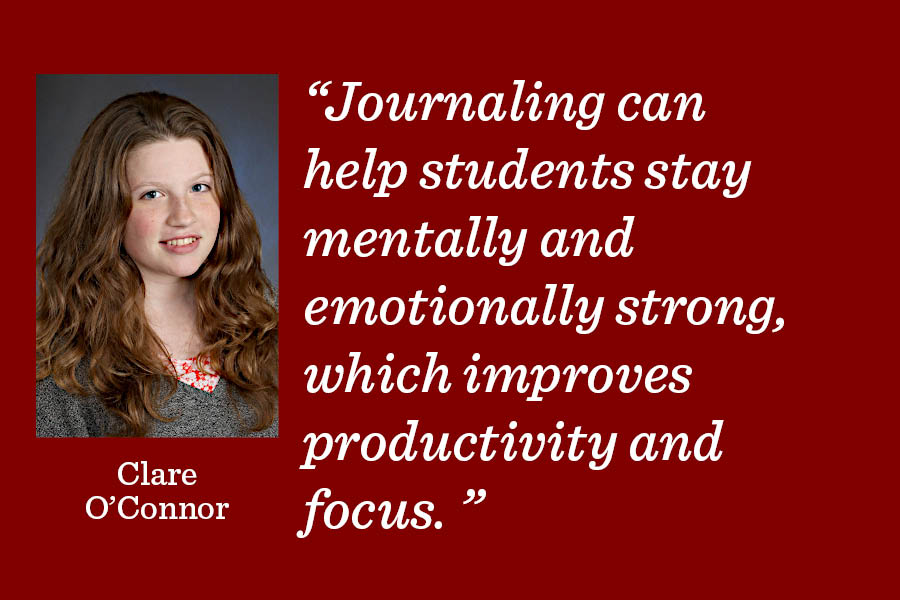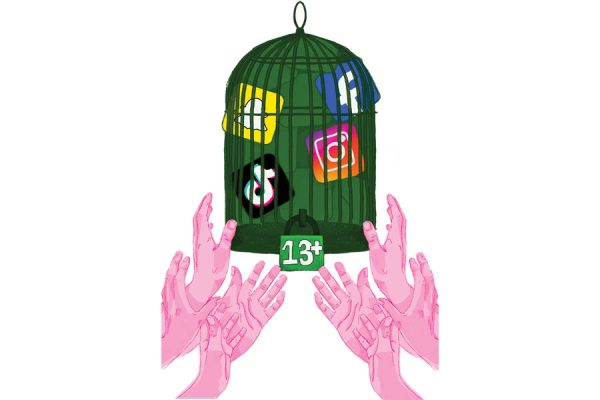Everyone can benefit from journaling, documenting daily experiences
Midway staff
Even if I close my computer after 20 minutes, never writing a single word, those 20 minutes were well spent because the process of piecing my thoughts together lets me see my feelings with clarity, even if I can’t quite put my thoughts into words, writes reporter Clare O’Connor.
December 15, 2020
After a long day of Zoom classes and online assignments, I open a Google doc I started at the beginning of the school year titled “Diary.” Sometimes I write a few lines of poetry riddled with spelling errors or make random lists of things that are stressing me out. An entry from Nov. 4 simply says, “I miss eating red fruit snacks and raspberry iced tea from the Caf.” Sometimes I stare at my computer for 10 to 15 minutes trying to figure out how to express emotions from my day.
Even if I close my computer after 20 minutes, never writing a single word, those 20 minutes were well spent because the process of piecing my thoughts together lets me see my feelings with clarity, even if I can’t quite put my thoughts into words.
Everyone can benefit from taking time to express themselves through prose, art, poetry or another medium, so students should consider journaling to document their experiences and emotions during the pandemic and to process this historical moment.
Journaling forces students to reflect on the impacts of this unprecedented time. High school is already stressful enough without the weight of a global pandemic. Distance learning makes schoolwork especially confusing and time-consuming, and even socializing takes effort to set up and enjoy. Social media bombards students with constant news about politics, inequities and tragedies. By taking the time to dive deeper into the minutiae of their stress, students might feel even more overwhelmed.
Even if journaling takes time away from schoolwork or other valuable activities, ultimately, that time away is worthwhile. Journaling can help students stay mentally and emotionally strong, which improves productivity and focus. Failing to address the emotional and even physical toll of students’ recent experiences will only lead to further suffering now, and long-lasting negative impacts in the future.
Writing notes at the end of the day or keeping a collection of drawings will not only help instill important events in student’s minds but can also serve as a time capsule for the future.
It’s clear that cultural events occurring right now will likely become defining points in students’ lives, and eventually students will want to understand how 2020 affected their formative years. So much has happened and changed so rapidly that it can be difficult to remember how we felt just a few months ago. This period will shape the lives of everyone, especially adolescents who are building their identities and opinions right now. Such a pivotal time is worth remembering. Writing notes at the end of the day or keeping a collection of drawings will not only help instill important events in student’s minds but can also serve as a time capsule for the future.
As a student, it can feel like every second is focused on moving to the next class, mapping out the next assignment or worrying that something is late. Amid that rush, unpacking and understanding feelings can be hard. Time is a catalyst that everyone — especially developing adolescents — needs in order to understand where and how outside factors are affecting us. Identifying emotions and trying to understand their causes allows students to effectively address and prepare for problems. Sometimes, realizations that come from reflection can’t be fixed or mitigated, but even understanding without resolution can help students feel less helpless and more at peace.
I hope every student takes some time regularly to document whatever compels them to help preserve this hectic and monumental year. Writing in a journal is the most traditional method, but some students may prefer to reflect through writing a melody on guitar or through a quick pencil sketch, I urge them to do that. In a time of little consistency, make a habit of spending 20 minutes to unpack your day.




















